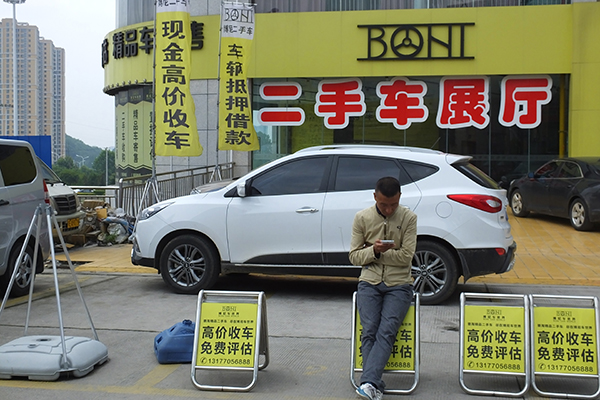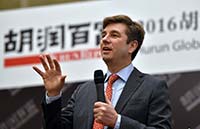Insiders hail new measures aimed at boosting used car sales
By Hao Yan (China Daily) Updated: 2016-07-11 07:24 |
|
A man sits outside a used car dealership in Yichang, Hubei province. [Photo provided to China Daily] |
Members of China's used vehicle sector hailed the national guidelines issued by the State Council, China's Cabinet, after an expansion was seen in the market in the first five months of the year.
Industry insiders also called for the abolition of restrictions on reregistering used cars bought in other cities, a move they believe would further boost growth.
Used-car sales in the country in May jumped 11.43 percent, which pushed the accumulated volume in the first five months up 4.89 percent, after 114 cities in eight provinces and autonomous regions lifted restrictions on used car registrations, according to the China Automobile Dealers Association.
CADA found that the average stock period for offline sales shortened to 24.8 days in May, and the association will launch the Used Car Procurement Management Index next month to better reflect the market situation.
Among the used cars sold in Beijing, 45.4 percent were subsequently reregistered in other cities in May, marking a significant rise on the average reregistration rate of 38 percent last year, according to data from the capital's Traffic Management Bureau.
"The policy is supporting the sector and giving once-in-a-lifetime opportunities.The used car trade volume will exceed 10 million units this year" said Shen Jinjun, chairman of CADA.
Shen urged the sector to prepare itself for the expected expansion. "The sector needs to strengthen commercial entities, regulate the market, cultivate consumers' habits and ensure there are adequate stock supplies," he said.
The State Council issued guidelines in March stating that 299 prefecture-level cities, mostly second- and third-tier cities, should abolish restrictions on the reregistration of used-cars bought in other cities from the end of May. However, Beijing, Shanghai, Tianjin, Guangzhou and other eight cities in Guangdong province, and Hebei, Jiangsu, Zhejiang provinces were exempted.
The restriction is still in place in 18 provincial administration regions: Fujian, Hainan, Heilongjiang, Hubei, Hunan, Jiangxi, Jilin, Qinghai, Shandong, and Yunnan provinces, as well as Chongqing municipality and the Tibet autonomous region, along with some cities in Shanxi, Liaoning, Gansu, Henan provinces and the Ningxia Hui autonomous region.
The restriction stems the flow of used cars across city and provincial borders and means that dealers are unable to adjust their stock to react to changing market demand. As a result, they are forced to either sell their remaining stock at below market value, or pay to deliver the vehicles they sell to customers buying from provinces and cities that have lifted the restrictions.
Xiao Zhengsan, secretary-general of the association, said: "Some provinces and cities ignored the consequences, and the restriction was initially launched by officials who didn't fully understand the repercussions it would have."
Chen Xiangda, president of the China Used-Car Dealers Chamber of Commerce, revealed how the restriction has affected those selling used cars in Pearl River Delta cities.
"In some extreme situations before the scrapping of the ban, many five- to seven-year old used cars have been scrapped purely as a result of the restrictions, despite the fact that each vehicle is still worth hundreds of thousands of yuan."
Chen added: "It's a huge waste of the nation's resources."
Nine cities in Guangdong province used to require used cars bought in other cities be in line with the National V Emission Standard that came into force in the region in January this year. It actually stopped the flow of used cars in the region, as almost all of used cars fail to meet the National V standard.
Dai Kun, chairman and CEO of Youxin Group and Xin.com, agreed: "The sector needs just one individual to win a case and set a precedent, then it could promote the free flow of the used cars across the country. A lawsuit will be supported by all stakeholders."
- China-Singapore program raises funds through int'l bond market
- China H1 economic growth in line with expectations: premier
- Intel China to boost robotic innovation
- Internet security firm Qihoo 360 to delist from NY exchange
- Baoshang Bank launches lending platform to fight poverty
- Tencent and China Music Corporation announce strategic merger in digital music business
- Changes in social financing show reforms picking up: PBOC official
- Japanese, US former officials to advise AIIB


















